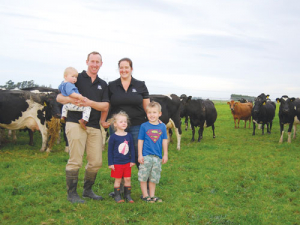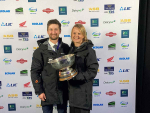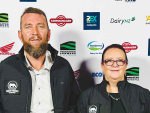A Mid-Canterbury couple in only their second season milking their own herd have been named the Canterbury/North Otago Share Farmers of the Year 2017 at the Dairy Industry Awards.
City-raised in Christchurch and with backgrounds in tourism and teaching, Christopher and Siobhan O’Malley are latecomers to farming, although there is dairying in Christopher’s family, his grandfather having farmed on the West Coast.
For them the journey started when they returned in search of a career change after two years managing a tourism business in Ireland, and began working on a farm near Darfield.
Liking what they found, they began lower-order sharemilking in 2011, moving to North Otago, then the West Coast, and North Otago again. Trading as Pukeko Pastures, the O’Malleys and their three children, Finnian (5), Aisling (3) and Ruairi (10 months), are now 50:50 sharemilking on a farm near Lauriston, inland from Rakaia, in Mid-Canterbury.
The couple like a challenge. “We like to stretch ourselves,” says Christopher.
Stepping up from lower order sharemilking to 50:50 meant taking on a huge amount of debt to buy the cows at a time when the milk price was low.
“That could have been stressful but we found it exciting,” says Siobhan.
They are milking 515 cows and hope to increase that to 630 next season. The property is 138ha effective, and mainly pivot-irrigated. They employ two staff.
This was their third time in the awards contest but only their first with their own herd.
Siobhan says the first reason to enter such competitions is to network with like-minded people.
“They tend to be people who are pushing themselves, who are reaching for big goals, who go for it. Another reason is to benchmark ourselves against those people to see how our business is stacking up against them.”
“[Entering] makes you do all those things you think will be good; it gives you a deadline, a push to finish all the little bits of analysis or data inputing. All that stuff that would be nice to look at in detail -- it forces you to do it.”
Siobhan says they like to live by a quote from the American poet Maya Angelou: “Do the best you can until you know better. Then, when you know better, do better.”
“So when we find a better way of doing something we don’t just say ‘Oh we could do it that way, but it might be a bit hard’. We do it. That might be a better system, a better product, or a better method of doing something on the farm.”
An example is their move to GPS plotting of their break fences to manage exactly how much feed the cows are getting, and allowing the herd two breaks into the fodder beet field when they realised one line was not giving each cow its recommended shoulder room.
In taking the regional title, the O’Malleys won the financial and business merit award – the single most important of the 11 judging criteria, weighted at 21% of the total score -- and also the Ecolab farm dairy hygiene award.
Christopher says winning the financial section required “a clear understanding of what you’re doing and why you’re doing it. And both of us know exactly that”.
Of the hygiene award, he said it was due to attention to detail.
“Everything starts at the cowshed. If you keep that clean and tidy and orderly, then other things in the business and staffing should flow from there.”
As Dairy News went to press the O’Malleys were due to go up against the regional winners from the other 10 regions, in the national finals. The national winner, and the national Dairy Trainee of the Year and the national Dairy Manager of the Year were due to be announced at a gala evening in Auckland on May 6.


















